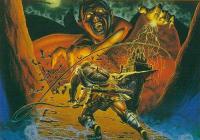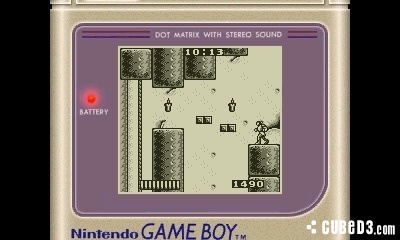Castlevania: The Adventure (Game Boy) Review
By Rudy Lavaux  15.07.2012
15.07.2012

The Castlevania franchise has become very quiet of late on Nintendo consoles, actually since the 2009 release of Castlevania: The Adventure Rebirth. However, it never got to rest for too long, with at least one major release gracing one system or the other almost every year since its inception on NES and MSX in 1986. After an in-depth surprise reveal at E3 2012, it is now set to come back with great fanfare on the Nintendo 3DS this year with Castlevania: Lords of Shadow - Mirror of Fate. Just like it did on Wii, Konami seems intent now on bringing back its back catalogue of Nintendo Castlevania through the 3DS Virtual Console, starting with the 1989 Castlevania: The Adventure. Old games don't necessarily translate too well years later, though. Let us see how it performs 23 years down the line.
The year is 1576, and players take on the role of Christopher Belmont, Simon Belmont's great-grandfather. Being released a mere two months before Castlevania III: Dracula's Curse, this makes it the first Castlevania game to introduce a different member of the Belmont family line. After a hundred year slumber, Dracula just woke up, according to the curse that befalls him that says the he shall awaken every Century. It is up to Christopher to go and put him back to sleep for another 100 years, wielding the famous “Vampire Killer” whip that was passed down to him in his family. This is done in a classic side-scrolling action-platform fashion, which was the traditional formula for the franchise for years. Each stage has involves jumping over obstacles while dodging and fighting enemies, with a boss fight waiting at the end. A few differences are immediately noticed, however.
For one thing, the pacing turns out to be much slower than what the series had us used to at the time, making the more platform-oriented sequences much harder to approach, and some of these can indeed be quite tricky. The stages aren't especially lengthy, with them being in line with the first Castlevania on the NES, but the slow pace means player don't get to see many different backgrounds since they scroll so slowly. The game isn't even very long either, with only four stages in total. Furthermore, the sub-weapon system used so far in the series (with the cross, dagger, holy water, and so on) is completely absent.

Although the whip still starts quite short, orbs can be picked up along the way, the first of which gives it some extra reach, while the second one allows the shooting of fireballs from its tip. This power lasts for as long as the lead character is not hit by an enemy. The whip won't shorten back to its initial form from another hit, though. Such a system was reintroduced in its sequel on Game Boy, but modern gamers might be more familiar with it from Castlevania: The Adventure Rebirth.
Due to this, the difficulty level is also quite brutal, although perhaps not quite on par with the first episode in the series. At least three difficulty levels exist, which are unlocked after beating the game (the action starts immediately again from the beginning after the credits, simply in a harder mode). Basically, the enemies progressively take more of Belmont’s health away with each hit as other difficulty levels are tackled. Since the game has no save function, starting from scratch every time the Game Boy is turned off is a requirement. However, this Virtual Console release obviously offers the same Quick Save functions as the others, making it more palatable, but also taking away most of the longevity of the title since back then its length relied on the multiple attempts needed to learn all the trap locations and the finding of best tactics to overcome each boss in the most effective way.

At least Castlevania: The Adventure comes with infinite continues to relieve some of the unnecessary frustration that comes with having to start the game over and over. The candles that can be whipped out also contain quite a bit of health refills (here in the form of hearts instead of the usual pieces of meat common to the series), which helps a lot too.
It is a learning process getting used to the clunky controls and slow-paced action, but that's not to say that the gameplay is completely broken either, because it's not; it's just different from the other incarnations from the same era and it simply hasn't aged very well. Many of these shortcomings must certainly have something to do with Konami not understanding the capabilities of the Game Boy at the time, since this was its first attempt at a game on the system, along with Motocross Maniacs released a few weeks earlier and, de-facto, one of its first handheld titles ever developed as well.

As a result, the graphics are not exactly very attractive either. The sprites are quite small and will appear pixelated on a larger screen, as well as horribly blurry if playing the game in full screen on a Nintendo 3DS. Some graphical glitches even appear at some points with no reason, and this has nothing to do with emulation because they already existed in the original version. A coloured version of the game was released on Game Boy Color in Europe, as part of the Konami GB Collection Vol. 1, but unfortunately the version available on the 3DS Virtual Console is the regular green / black and white incarnation.
One of the highlights of the game, however, is its soundtrack. The music is excellent, and for such an early Game Boy game, this was quite a feat. It is just unfortunate that the composer only got to create a few different tracks, given the small amount of stages where they would fit.
Overall, the Game Boy Color version inside Konami GB Collection Vol.1 should be preferred since it's a bit easier on the eyes. Even better, gamers should get the fantastic re-imagined WiiWare version. With that said, the 3DS Virtual Console release comes cheap enough so that fans should not regret their purchase too much. However, even if it's currently one of the cheapest ways available to get hands-on with the series, it certainly isn't the best place for newcomers to the franchise to get started on it, for fear that they just feel like never trying an episode ever again, which would be a grave mistake.

Cubed3 Rating
Average
Castlevania: The Adventure wasn't exactly a masterpiece back in its day because it compared poorly to its home console brethren. Sadly, the passage of time hasn't helped it there: graphics, controls and longevity don't play in its favour by nowadays standards. Fans of the series that never got to try it back in the day may still find some interest in it though, if only for its historical value and the fantastic compositions. All-in-all, players should probably wait for the inevitable arrival of its vastly improved sequel on the 3DS Virtual Console.

![]() 5/10
5/10
![]() 0
(0 Votes)
0
(0 Votes)
 Out now
Out now  Out now
Out now  Out now
Out now  Out now
Out now Comments
Comments are currently disabled

 Sign In
Sign In Game Details
Game Details Subscribe to this topic
Subscribe to this topic Features
Features





 Top
Top

